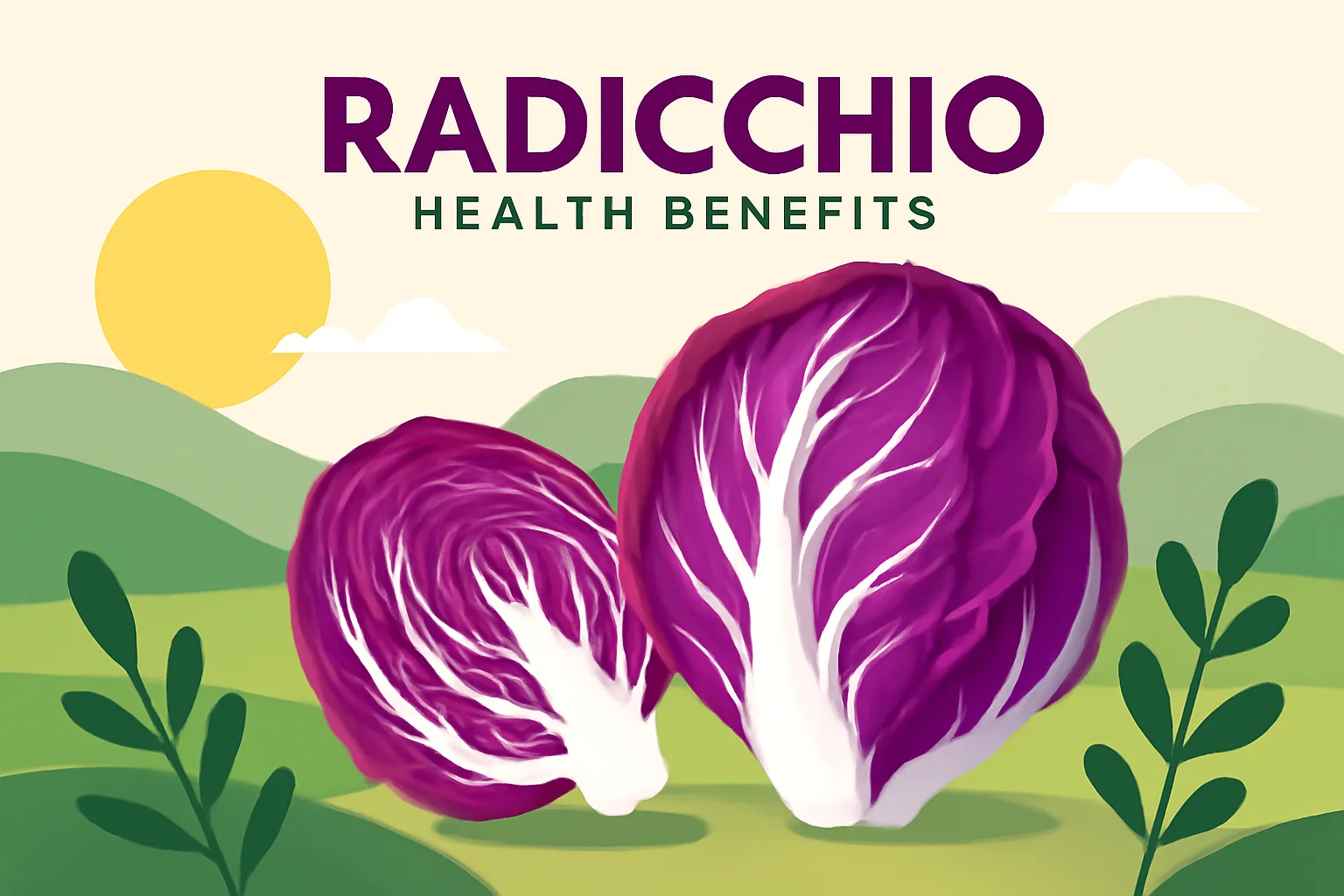
The beneficial effects and health benefits of radicchio
The radicchio, a beautiful purple salad vegetable, not only provides an aesthetic experience during meals but also possesses numerous beneficial effects. Popular in Italy, particularly in the Veneto region, this special vegetable has been discovered in many parts of the world today. The radicchio’s distinctive bitter taste and crisp texture make it a unique addition to salads, pizzas, and other dishes.
Rich in nutrients, it is full of vitamins, minerals, and antioxidants that contribute to a healthy lifestyle. Additionally, radicchio is not only delicious but also low in calories, making it an ideal choice for those on a diet. In recent years, scientific research has increasingly focused on the beneficial effects of radicchio, and many experts recommend its regular consumption. Now, let’s explore the specific benefits this special vegetable offers!
The Nutritional Components of Radicchio
The nutrient profile of radicchio is extremely rich, as it is packed with vitamins and minerals. One of the most important vitamins found in it is vitamin K, which is essential for blood clotting and bone health. Vitamin K helps with calcium absorption, thus contributing to strengthening bones and preventing osteoporosis.
In addition, the vitamin C content of radicchio is also noteworthy. Vitamin C is a powerful antioxidant that helps neutralize free radicals, potentially reducing the risk of chronic diseases. Furthermore, vitamin C supports immune system function and aids in wound healing.
Radicchio is also rich in minerals such as potassium, calcium, and magnesium. Potassium plays an important role in maintaining cardiovascular health by helping regulate blood pressure. Calcium and magnesium contribute to normal muscle function and the health of the nervous system.
Moreover, radicchio is high in fiber, which is essential for proper digestion. Fiber supports gut health, reduces the risk of constipation, and contributes to the normal functioning of the digestive system. Adequate fiber intake can also help regulate body weight, as it provides a feeling of fullness for a longer time.
Antioxidant Effects and Anti-Inflammatory Properties
One of the most significant beneficial effects of radicchio is its antioxidant content. Antioxidants, such as polyphenols, help protect cells from damage caused by free radicals. The formation of free radicals occurs during the body’s normal metabolism, but environmental factors such as pollution, stress, and smoking can also contribute to their increased numbers.
Regular consumption of radicchio may help reduce chronic inflammation. Inflammation can lead to the development of various diseases, including heart disease, diabetes, and cancer. Through the combination of antioxidants and anti-inflammatory compounds, radicchio may contribute to lowering the risk of chronic diseases.
Research has also shown that radicchio can help maintain liver health. The liver is the body’s detoxification center, responsible for processing and eliminating toxins. The compounds found in radicchio may support liver function, thereby contributing to detoxification processes.
Additionally, the vitamins and minerals found in radicchio also contribute to skin health. Antioxidants help protect the skin from harmful UV rays and can slow down the aging process. Vitamin C aids in collagen production, thus contributing to skin elasticity and firmness.
The Role of Radicchio in Cardiovascular Health
Consuming radicchio can be particularly beneficial for cardiovascular health. Due to its low calorie content and high fiber content, radicchio can be an ideal choice as part of a heart-healthy diet. Adequate fiber intake can help lower cholesterol levels, which is crucial for preventing heart disease.
The flavonoids and polyphenols found in radicchio also contribute to heart health. These compounds may help reduce inflammation and improve the elasticity of blood vessel walls. Research suggests that regular consumption of flavonoids is associated with a lower risk of heart disease.
Furthermore, the potassium content in radicchio plays an important role in maintaining cardiovascular health. Potassium helps regulate blood pressure by reducing the effects of sodium in the body. Maintaining proper blood pressure is essential for preserving heart health and can help prevent heart attacks and strokes.
The antioxidant effect of radicchio also contributes to heart health by helping protect heart muscle from damage caused by free radicals. To prevent the development of heart disease, it is important that our diet is rich in antioxidants, vitamins, and minerals.
How to Incorporate Radicchio into Your Diet?
Radicchio is versatile in the kitchen, making it easy to incorporate into various dishes. It can be used fresh in salads, steamed, grilled, or even on pizzas. Due to its distinctive flavor, radicchio pairs well with other vegetables, fruits, and various dressings.
The simplest way to consume radicchio is by adding it to salads. Mix it with other fresh vegetables, such as tomatoes, cucumbers, or avocados, and drizzle with a delicious dressing, such as a mixture of olive oil and balsamic vinegar. The bitter taste of radicchio nicely balances the sweeter components of the salad.
It can also be very tasty when steamed or grilled. Steaming radicchio softens its flavor, making it easier to incorporate into various dishes. Grilling gives it a delicious smoky flavor, which can be a great complement to meat dishes.
Radicchio can also be used on pizzas, where its flavor changes during baking, adding a unique character to the dish. Combined with different cheeses and meats, it can create a truly special meal.
Don’t forget to use the least amount of heat treatment possible to preserve the nutrient content of radicchio. Fresh, raw radicchio retains most of its nutrients, so it is worth consuming it frequently.
Last but not least, always ensure that the radicchio comes from organic sources, preferably from organic farming, to consume the highest quality vegetable possible.
**Disclaimer:** This article does not constitute medical advice. In case of health issues, everyone should follow their doctor’s recommendations.

